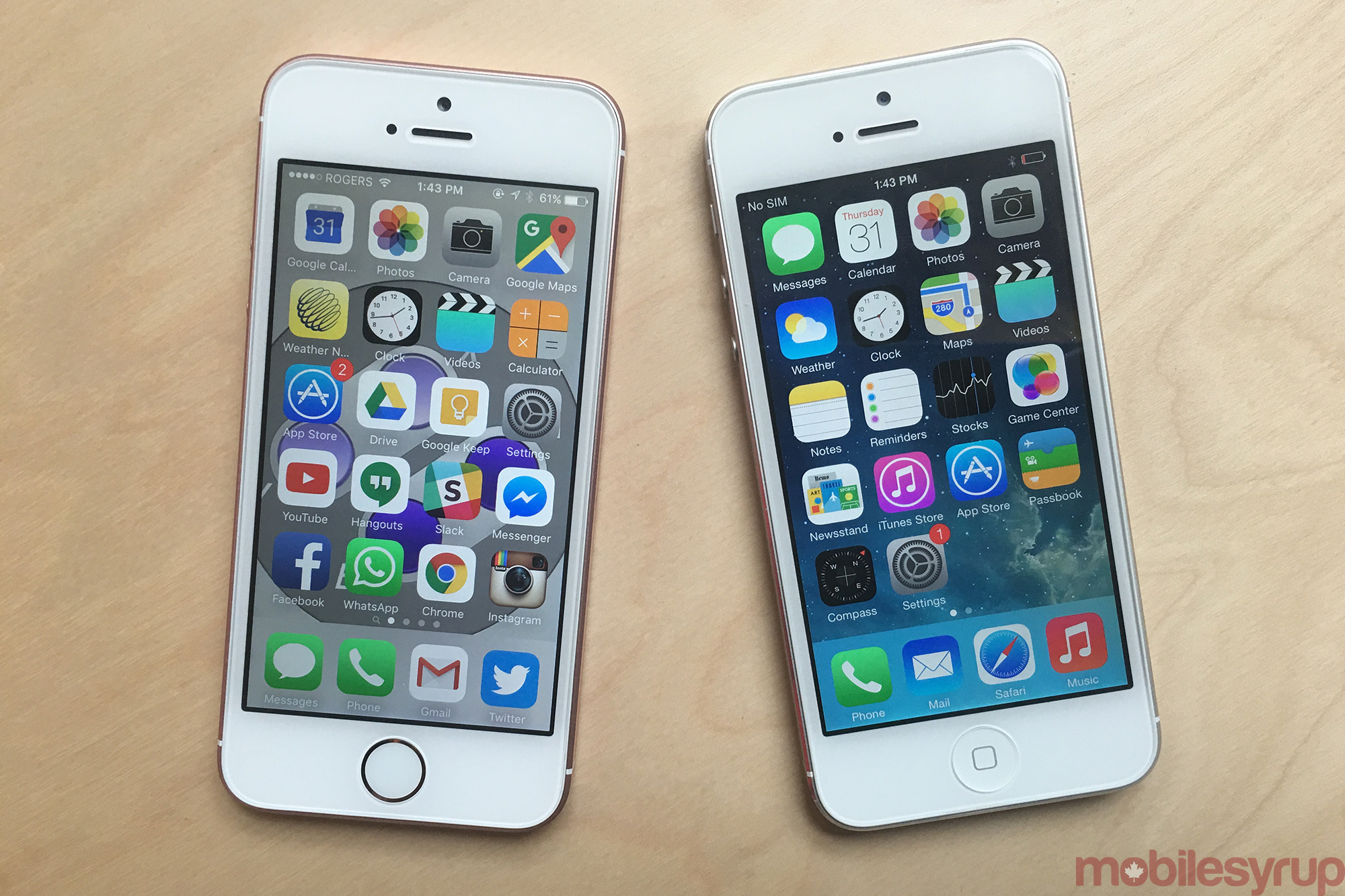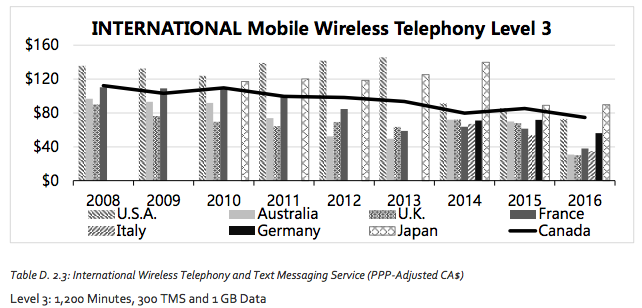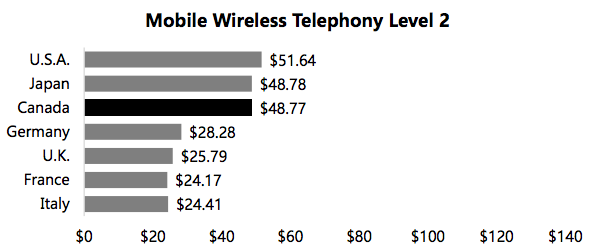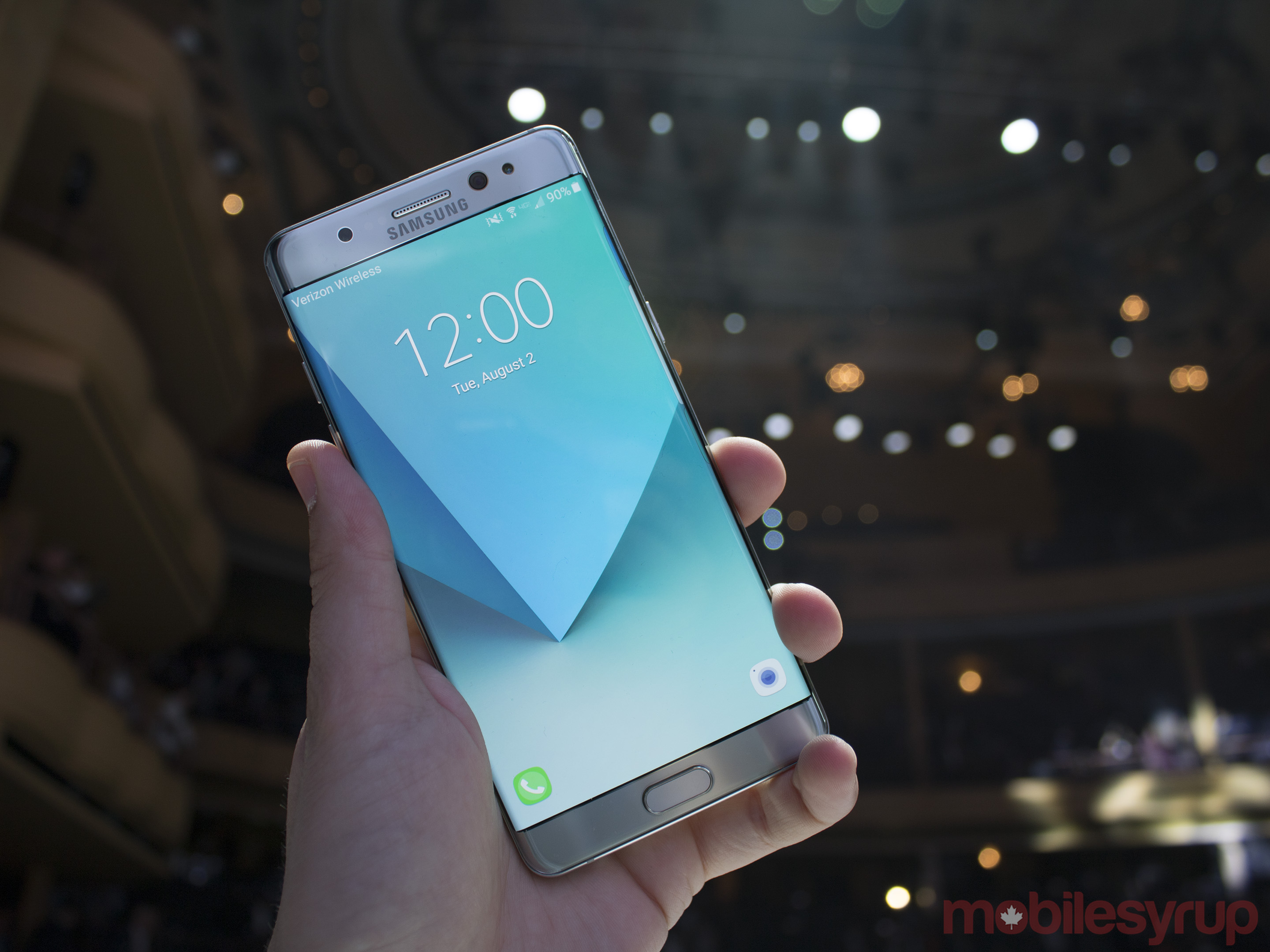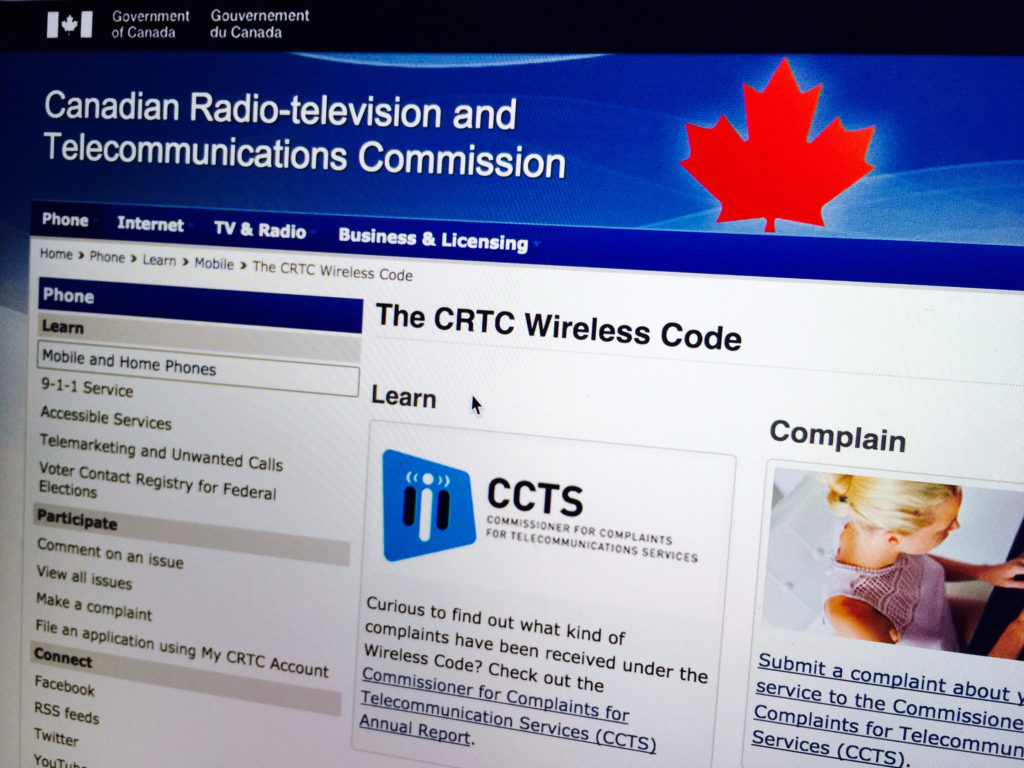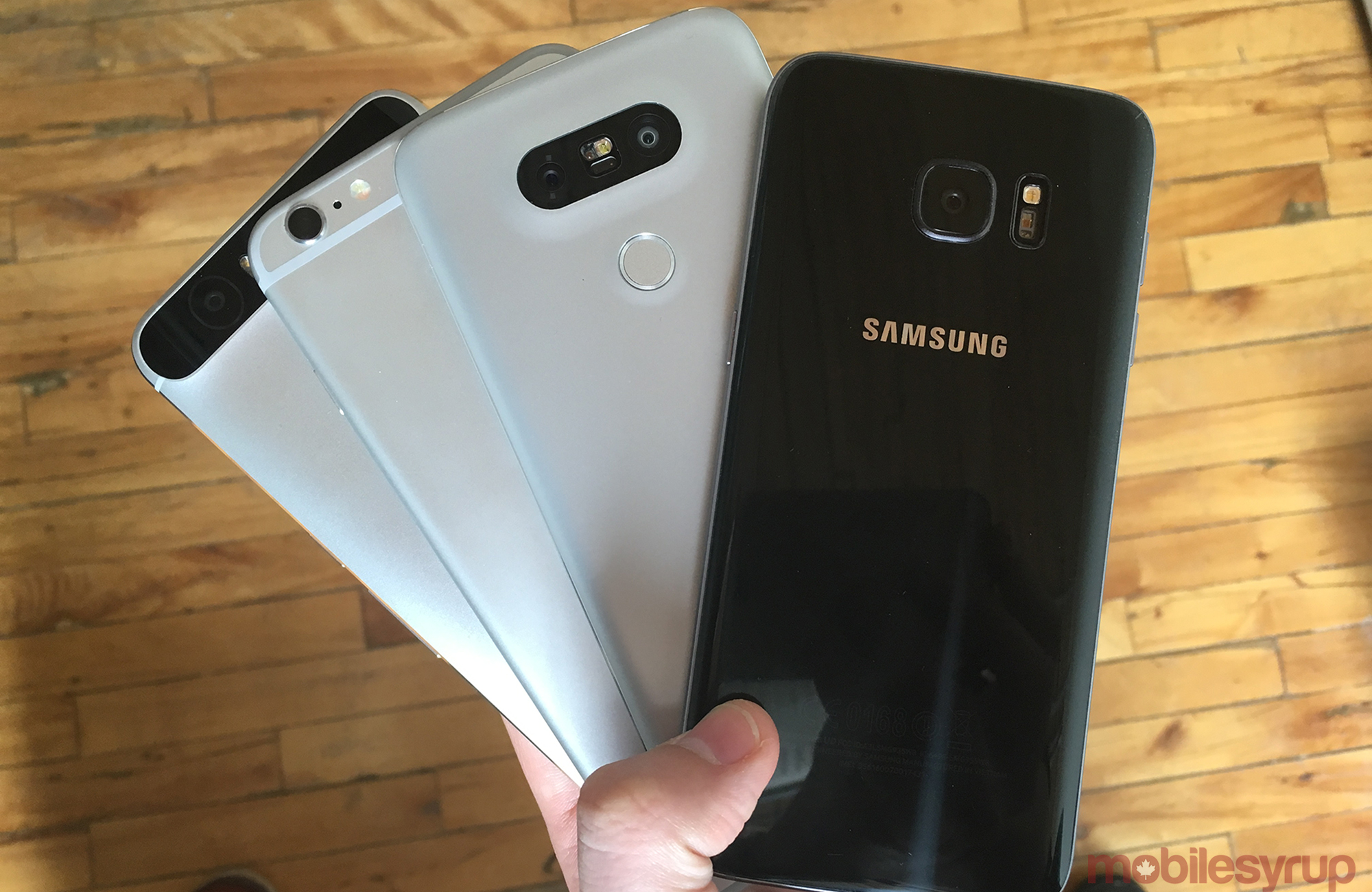
The CRTC has released a new report that compares Canadian mobile and wireless pricing with that of several foreign countries.
The report draws on wireless pricing for telecommunications services from Canada, the U.S., Australia, Japan, the U.K., France, Italy and Germany.
The 2016 study is broken down in to five main categories: home phones, mobile wireless, mobile Internet, broadband Internet and bundled services, with sub-categories for each type of service — family plans are filed under the mobile phones category, for example.
While Canada ranks among the highest paying countries in all categories, including mobile wireless, Internet and bundles, the country consistently ranks sixth lowest out of the eight total countries across all levels of home phone service.
Mobile Wireless
According to the study, Canada ranks among the highest paying countries in each of the six tiers of mobile wireless service defined by the CRTC.
Specifically, Canada is the highest paying country among those listed for the level one tier, averaging a price of $41.08 for 150 minutes. The lowest at that level is Germany at $17.15 per month.
Canada is the third highest paying country for level two service, averaging a price of $48.77 for 450 monthly minutes and 300 SMS text messages. Ahead of Canada in this category are Japan in second place and the U.S. in first place at $51.64.
Canada ranks the second highest paying country for level three service, averaging $74.67 for 1,200 monthly minutes, 300 SMS text messages and 1GB of data.
Canada continues to be the second highest paying country for levels four through six of the mobile phone section, paying anywhere between $80 and $230 for monthly mobile telecom services consisting of 2 plus GB of data, unlimited minutes, 300 plus SMS messages, and up to three lines for level six.
For context, level four service consists of unlimited minutes, 300 SMS text messages and 2GB of data; level five service consists of unlimited minutes, unlimited SMS text messages and 5GB of data; and level six consists of unlimited minutes, SMS text messages and 10GB of data.
The big three Canadian carrier’s most popular plans feature 2GB of data, unlimited minutes and unlimited text. In the context of this report, level four service most closely matches these features at approximately $81.05 per month.
Mobile Wireless Internet
The report also cites mobile wireless internet services, which were ranked from levels one to three. Canada ranked third most expensive for all three service baskets. Ahead of Canada in this category are Japan and the U.S.
Level one consists of less than 1GB to 5GB of data, for which Canadians pay a monthly average of $46.47. Level two consists of 5GB to less than 10GB of data, for which Canadians pay a monthly average of $ 63.30. Lastly, level three consists of 10GB of data or more, for which Canadians pay a monthly average of $80.98.
Home Phone
Somewhat surprisingly, Canada ranked among the least expensive locales in the fixed telephony category. The report categorized these plans into three tiers ranging from 400 minutes with 10 percent long distance to 1,600 minutes with 30 percent long distance.
Australia and Japan took the top spots, with Australia showing a 23.2 percent increase over Canada’s first tier price of $39.52 with a whopping $51.43 charge. Meanwhile, Japan on average charged $85.17 for the third tier plan, while Canada charged on average $60.32.
Broadband Internet
As for broadband internet, Canada returns to the top of the charts for most of the specified tiers, which are categorized by speed, ranging from 3-9 mbps to over 100 mbps. When it comes to the two fastest categories, Canada ranks second, outdone only by the Americans.
The average price for 41-100 mbps internet in Canada is on average $78.77 per month, while in the U.S. it comes in at $112.30. In comparison, the lowest is Japan with $49.78. When it comes to plans over 100 mbps, Canada jumps to $114.65, around 10 percent less than the States’ $127.69 charge. In this category, Germany claims the lowest spot, with $56.57.
Bundles
Canada ranks among the top three for costs across all three of the tiers in the ‘Bundled Services’ section of study. For a package that includes home phone, wireless and Internet services, Canadians pay on average $161.63, while Americans pay $141.40, and U.K. residents, at the lowest end, pay $67.19.
For home phone, Internet and TV, Canadians pay $135.60, placing it behind Japan and the U.S., which come in at $151.08 and $145.92 respectively. For the quadruple play — home phone, Internet, TV and wireless, Canadians generally pay $185.06. Japan and the U.S. once again top that with respective charges of $198.54 and $196.70. In comparison, the lowest price country is again the U.K., with an average charge of $65.27.
Methodology
The CRTC’s report was created by strategy, policy and economic analysis firm Nordicity.
As for method, the prices were created by averaging prices across in Canadian equivalent dollars. In Canada, the prices were sourced from Halifax, Montreal, Toronto, Winnipeg, Regina and Vancouver, while in the U.S. the price was averaged across three cities, and in the other international destinations the average was taken from just one principal city.
Because of this strategy, the CRTC notes in its caveat that “the prices cited for Canada, U.S. or the international jurisdictions are not meant to be statistically representative of the individual countries as a whole.”
Additionally, the price data was collected through a survey conducted January and February 2016, so the regulatory body warns that the study only represents a “‘snapshot’ of prices in time.” It urges consideration of the fact that plan prices are constantly evolving, and that price differentials are also highly sensitive to currency fluctuations.
The CRTC also noted that it did not account for any cost of service or socio-economic factors, including population density, climate affordability indicators or number of minutes of usage per subscriber.
Jessica Vomiero and Rose Behar contributed to this story.
Related reading: CRTC seeking feedback from Canadians on the Wireless Code of Conduct
[source]CRTC[/source]

